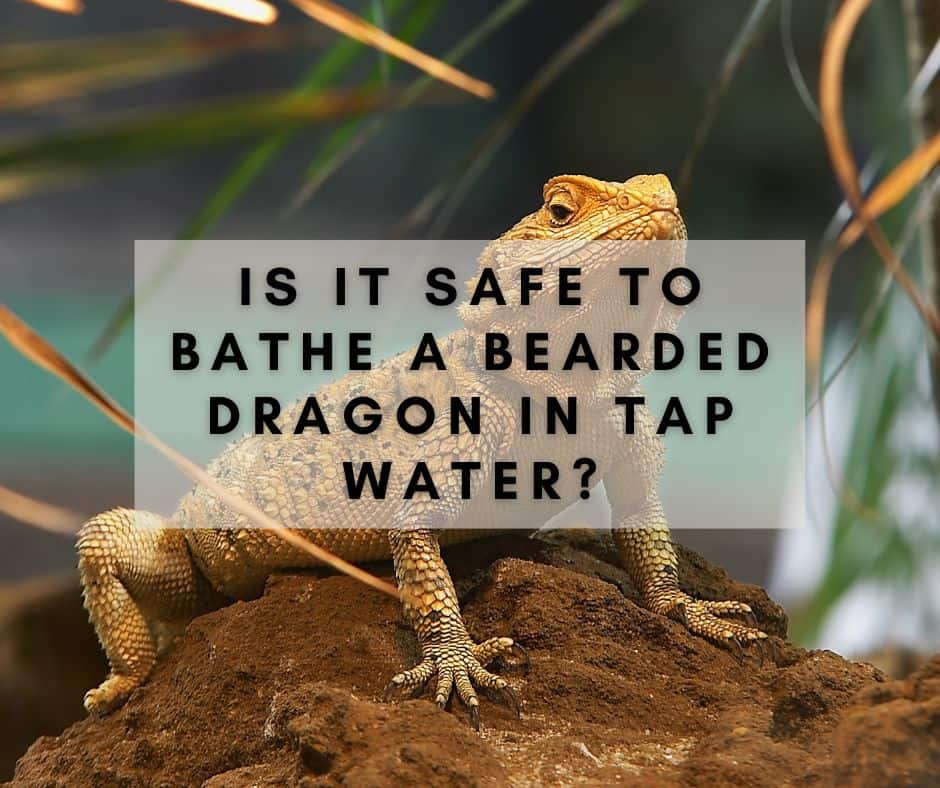Bathing a Beardie helps with hydration, as bearded dragons absorb water through their skin. However, there is a common misconception that tap water is safe for bathing bearded dragons.
This couldn’t be further from the truth. Most tap water contains chemicals such as chlorine and fluoride that can harm the level of acidity in a reptile’s digestive system leading to potentially harmful effects on its overall health.
These chemicals can cause skin irritation or even worse, lead to severe health problems. Many pet owners assume that because they drink tap water without issue, it must also be safe for their pets.
But what works for humans does not always work for animals. It’s essential to understand the potential risks associated with using tap water before bathing your bearded dragon in it.
Contents
The Common Misconception About Tap Water
One of the most significant misconceptions about bathing bearded dragons is that tap water is safe for them when used in moderation. Unfortunately, this isn’t true because there are many potentially harmful components present in typical household tap water.
Chlorine and fluoride are two of these major chemicals found in most public drinking systems across North America; these chemicals have shown harmful effects on reptiles’ digestive systems when consumed regularly over time leading to possible skin issues as well as other more severe health problems depending on the level of exposure. Understanding how to properly care for your pet lets you know the right way to make sure they maintain excellent health all throughout their life span – including a bath routine suitable for them!
Just like parents who keep an eye on everything their kids eat or come into contact with, pet owners must do the same by taking measures to help maintain their pet’s health and minimize any risks associated with bathing. It’s essential to know what chemicals are present in your tap water and consider safer alternatives for your pet’s hygiene routine.
Understanding Bearded Dragons and Their Bathing Needs
The Importance of Proper Hydration for Bearded Dragons
Bearded dragons are desert creatures that require a lot of water to stay hydrated. In their natural habitat, they get most of their hydration from the food they eat, but in captivity, it’s essential to provide them with a regular source of water.
Adequate hydration is crucial for the healthy functioning of their organs and can prevent health issues such as kidney stones. While providing your bearded dragon with a bowl of fresh water is important, not all dragons will drink from it.
Some may prefer to get their hydration from baths or misting. It’s important to keep an eye on your bearded dragon’s behavior and ensure they’re getting enough water.
How Regular Baths Can Help Keep Their Skin Healthy and Clean
Bathing your bearded dragon regularly can help keep its skin healthy and clean. In the wild, they would frequently dig in moist areas to help shed their skin, but in captivity, providing them with regular baths can simulate this natural process.
During bath time, you can use a gentle soap specifically formulated for reptiles to remove any dirt or debris on your bearded dragon’s skin. This will prevent the buildup of skin fungus and bacteria that could lead to infections.
Additionally, bathing your bearded dragon can help soothe dry or irritated skin caused by shedding or other conditions such as mites. A good soak in warm water will also relax your pet and provide some much-needed exercise while keeping them clean at the same time.

The Safety Concerns of Using Tap Water for Bathing Bearded Dragons
Many bearded dragon owners assume that tap water is safe for their pets. However, tap water can contain chemicals like chlorine and fluoride that can be harmful to your pet’s health.
Chlorine is commonly used in tap water to kill harmful bacteria and viruses that can cause diseases. Fluoride, on the other hand, is added to tap water to help prevent tooth decay.
While these chemicals may be safe for humans in small amounts, they can be toxic to bearded dragons. Chlorine can irritate their skin and eyes, causing redness and discomfort.
When ingested, it can upset their digestive system and cause diarrhea or vomiting. Fluoride can also negatively affect the health of bearded dragons by interfering with calcium absorption.
This can weaken their bones over time, making them more prone to fractures. In addition to these harmful chemicals, tap water may also contain other contaminants such as heavy metals or pesticides that could further harm your pet’s health if ingested or absorbed through the skin during bathing.
The Potential Risks Associated with Using Tap Water
It’s important to understand the risks associated with using tap water before you give your bearded dragon a bath. The most significant risk comes from the presence of chlorine and fluorine in tap water since these chemicals are highly toxic for reptiles like bearded dragons. Chlorine exposure from baths has been linked with skin irritation in many animals including fish and amphibians as well as reptiles such as snakes and lizards.
Similarly, when ingested through drinking or bathing in it fluoride levels above safety limits are known to increase spontaneous bone fractures which could have serious consequences for a young growing dragon. Overall while using pure unfiltered tapwater isn’t intrinsically dangerous, it can contain a number of contaminants that are not safe for your pet and therefore it is important that you seek alternative ways to give your bearded dragon a bath.
Alternatives to Tap Water for Bathing Bearded Dragons
Purified Water: A Safe Alternative for Bearded Dragon Baths
When it comes to bathing your bearded dragon, it’s essential to use safe alternatives that will not pose any health risks or irritate their skin. One of the best options is purified water, which can be purchased in stores or produced at home using a water filter. Purified water is free from harmful chemicals such as chlorine and fluoride, which are commonly present in tap water.
These chemicals can cause skin dryness, irritation, and even respiratory problems when absorbed by the skin or ingested. Purified water also helps maintain a balanced pH level in your pet’s body since it contains fewer minerals and impurities that could disrupt their natural balance.
It’s important to note that using distilled water can lead to mineral deficiencies since the process of distillation removes all minerals present in the original source of water. However, providing a balanced diet with adequate nutrients can prevent this issue.
Filtered Water: The Cheaper Option for Healthy Bearded Dragons
Another safe alternative for bathing your bearded dragon is filtered water. This option works well for pet owners who want a cheaper alternative to purified or bottled water without sacrificing safety and quality. A high-quality filter system can remove most impurities from tap water while still retaining essential minerals that promote healthy skin and scales.
Before opting for a filtered-water bath, ensure that you have an efficient filtration system installed in your home or purchase high-quality portable filters designed specifically for reptile care. You should also make sure you change the filters regularly based on manufacturer instructions; failure to do so may result in reduced filtration efficiency and exposure to harmful chemicals.
Overall, using safe alternatives such as purified or filtered water is crucial when it comes to providing proper care for your bearded dragon during bath time. These options help avoid any potential health risks from chemicals in tap water while also promoting proper hydration and healthy skin.
How to Bathe Your Bearded Dragon Safely
Bathing a bearded dragon may seem like a simple task, but it’s essential to do it safely to avoid any harm to your pet. Here are step-by-step instructions on how to properly bathe your bearded dragon:
- Prepare the Bathing Area: Before introducing your bearded dragon into the bath, make sure you create a suitable area for them. Fill a shallow container with an inch or two of water, ideally at a temperature between 90-100°F. Place some rocks or non-slippery objects in the container so that your pet can climb and move around comfortably.
- Introduce Your Bearded Dragon: Gently place your bearded dragon in the water and let them explore their surroundings. Never leave them unattended during bath time as they may accidentally ingest water or slip and hurt themselves.
- Clean Them Up: Use a reptile-safe shampoo designed specifically for bearded dragons and lather up their skin gently, avoiding their eyes, ears, nose, and mouth areas. 4. Rinse Them Thoroughly: Rinse off all the soap from your pet’s skin using clean water.
Make sure there is no soap residue left behind as it can irritate their skin. 5. Dry Them Off: Use a soft towel or paper towels to dry off your bearded dragon gently, taking extra care not to rub too hard on its skin.
The Importance of Monitoring Temperature and Duration of Baths
It’s crucial to monitor both the temperature and duration of baths when bathing your bearded dragon. Here’s why:
Temperature Control
Bearded dragons are cold-blooded animals that require an external heat source to regulate their body temperature correctly. For this reason, if the water is too cold, they might become stressed or even sick from hypothermia; if the water is too hot, they might burn themselves or become dehydrated. Therefore, it’s essential to maintain the water temperature between 90-100°F throughout the bath.
Bearded dragons shouldn’t stay in the bath for too long.
The recommended bath time is around 15-20 minutes per session, and you shouldn’t bathe them more than once a week. Overbathing can lead to bacterial infections or skin irritation.
Bathing your bearded dragon is a vital part of their hygiene routine, but it’s crucial to do it safely and correctly. By following these simple steps and monitoring the water temperature and duration of baths, you can keep your pet healthy and happy.
Conclusion
Now that we have discussed the important aspects of bathing bearded dragons, it is clear that using tap water can put your pet at risk. The high levels of chlorine and fluoride in tap water can harm their skin and overall health.
While some bearded dragons may not show any immediate symptoms, repeated exposure to these chemicals can cause long-term damage. It is essential to use safe alternatives such as distilled or filtered water when bathing your bearded dragon.
These alternatives will help avoid any potential harm caused by the harmful chemicals present in tap water and maintain your pet’s health and well-being. As a responsible pet owner, it is crucial to ensure that you are taking all necessary steps to keep your bearded dragon healthy and happy.
Proper hydration is essential for all living organisms, including bearded dragons. Regular baths can help keep their skin clean and healthy while also providing mental stimulation.
However, using tap water for bathing can put your pet at risk due to its chemical content. Therefore, using safe alternatives such as distilled or filtered water should always be used when bathing your bearded dragon.
As a final thought, remember that there are plenty of resources available online or from veterinary professionals if you have any further questions about caring for your reptile pets. By following some simple guidelines like the ones discussed in this article, you can ensure a long and happy life for your beloved bearded dragon!




